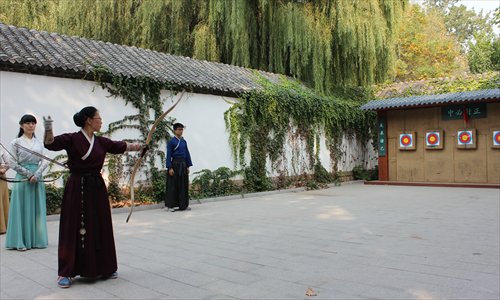
An archery student shoots at a target on the archery range at the Nishan Academy in Shandong Province. Photo: Li Jingjing/GT
A model for modern society
Zhao Ping, one of the students at the academy, has been learning Chinese archery for three years. She explained to the Global Times that unlike current bows, traditional Chinese bows are long, large bows that lack any sights for aiming.
"Where the arrow hits doesn't matter, what matters is the process of shooting a bow. It's a process of cultivating one's mind," Zhao said.
She explained that learning archery taught her not to care about how she performs compared with other people, since it's her own state of mind that allows her to make a good shot.
"Ever since I started practicing archery, my friends told me my manner and temperament have changed. I really feel myself changing inside. I reflect on myself everyday with every shot I take. It affects how I socialize with others as well," Zhao said.
While it appears to be just a sport, in practice the skill is more like deep meditation. "Tai Chi, guqin, all these traditions share some similarities, they change a person from the inside," she said.
In order to revive ancient form of educational institution and get people more involved in modern libraries, in May of this year the Culture Department of Shandong Province implemented a new model of public cultural service by establishing small "Nishan Acadamies" in libraries across the province. Months later, this new model continues to attract more people. However, in an interview with the Global Times, Yu admitted that the majority of attendees are retired people who have more time to attend. Children make up another large group, since these academies cooperate with schools to arrange summer camps. Figuring out ways to get young adults and middle-aged people involved has become one of the biggest challenges for the program.
Yan Binggang, the vice president of the Advanced Institute of Confucian Study at Shandong University, told the Global Times of another reason promoting traditional Confucian culture in urban areas can be so difficult. "Due to the Cultural Revolution (1966-76), some older people in cities are prejudiced against Confucius. It's difficult to reverse such an ingrained idea."
Despite these difficulties Zhao is confident of the program's merit, even if most students are senior citizens. "Children learn from others. When older citizens do something, children tend to do the same as well," she said.
We Recommend:
